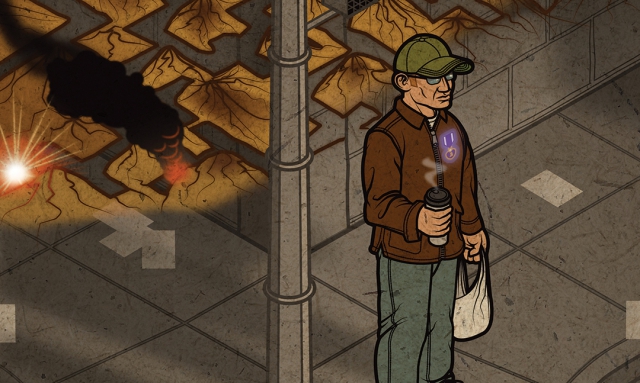
The Mind Field: Alternative Routes of Recovery, Combat Memories
For some, time in combat is just the length of a tour. For others, war is everlasting. Facets of a personal war are sometimes shrouded in the labyrinth of the mind, only to occasionally emerge for others to see. For all who experienced it, combat is a constant – sometimes controlled, sometimes not – like most life events.
The person you see across the room or sitting in the subway may be in a place you cannot go and dealing with issues you cannot see. But they are very real, these invisible wounds.
The smoke of battle may clear the field, but its residue lingers in the minds of those who first saw its shades, tremors and eruptions in a time since passed at a place far away. A spark of suggestion can bring it all back from the darkest recesses to the brightest light of recognition and reaction. In this way, war is always with you.
Each participant of war returns with a personal toolkit of controls and the unprogrammable impulses of memory, each to counterbalance the other.
A child looks at his father, newly returned from the most recent of many deployments, and asks, “Were you in combat?”
For those who have experienced the great difference between merely deploying and serving somewhere, and those who were seriously and mortally engaged, the answer would have to be, “Yes, but ....” The answer is not as simple as it may seem.
Combat changes people. It’s not a routine matter of leaving it all behind when one boards the plane to return home. Everyone has some secret file cabinets of the mind. They can be quite extensive and subject to unexpected openings, viewings and withdrawals. The human coping mechanism provides a variety of resolutions that each person draws upon to keep the cabinet closed and unknown to companions and relations.
On the surface, everything appears normal. Underneath, suppressive mechanisms are hard at work keeping the darkness contained. In many cases, the bearer is unaware until some specific moment, gesture or scene turns the past into the present. Domestic relationships become adjusted as new aspects of a personality emerge. New obsessions, behavioral patterns, long moments of silence, inability to communicate as in the past, or just a distant eye on a quiet day indicating that the cabinet is opening: “Yes. I was in combat today, and I always will be.”
Walking through a farm field, the terrain takes on new significance. Fields of fire are mentally plotted. The best defensive positions are selected. Likely avenues of approach are scanned and noted. The new corn and soybean fields are seen as visual distractions as the mental military calculus unfolds. The fields walked as a boy with a father are no longer friendly.
Crossing the street, a judgment is made as to possible sniper placements, the best building access point, the location of covering forces and the best position for overwatch. Starbucks is just across the walkway, but there is an imaginary platoon securing its perimeter.
The most important game of the year is on the tube one bright Sunday morning. A phone rings, and a conversation unfolds. The game is ignored for a considerable time. A specific time and place are scheduled. If it conflicts with an important family event, that’s unfortunate. This is more important and has to be done. This person on the other end was with me one dark day.
The helicopter ambulance passes overhead. A quick glance opens the cabinet full and wide. Out pours a scene from some time ago. Dust, smoke, streaking tracers, sudden explosions and dark silence are accompanied by great pain. No one else sees this. It’s combat.
In a quiet moment, he can hear past conversations unheard by others in the room. They are hard, cynical jokes with morbid senses of humor. He hears the talk and in his mind’s eye sees the faces of his fellow soldiers with shoulders against the mud dike of an unnamed village just barely discernible in the gray dawn.
We survived the night. Now we have to work on the day. “One more day, God. One more day.”
There’s a pause in the room while everyone looks at him as he returns from his world to theirs.
The kitchen has always been the repository of the best family feelings. The aroma of a roast, a soup or a favorite pastry unlocks the most pleasant of memories. Sometimes, for whatever reason or stimulus, the aroma changes. It turns harsh with cordite, hot JP-4 and the ugly deep breath of a newly opened abdomen. Blood has a unique odor that lingers far longer than it takes to wash off the hands. The reason for the sudden grimace amid
all the goodness is lost on the others in the room.
To clear his head, he walks out the door. The rich earth of his lawn and rose bed suddenly become that pungent odor of the village last cleared. Back from the war, he is still in combat.
Purple Hearts are awarded for wounds received in combat. Regulations require that they be the result of hostile action and require medical treatment. For those who receive the award, the wound is, or was, obvious.
There is no such provision for those who suffer mental wounds and the weight of each combat participant in the struggle to keep that dark cabinet closed. There is no Purple Heart for wounds not seen that often go untreated. They are wounds nonetheless.
“Were you in combat?” the child asks.
“Yes. I was in combat, and I am now.”
Keith Nightingale is a retired Army colonel, military history writer and frequent contributor to The American Legion Magazine. He was in combat.
